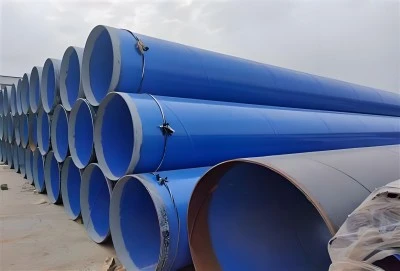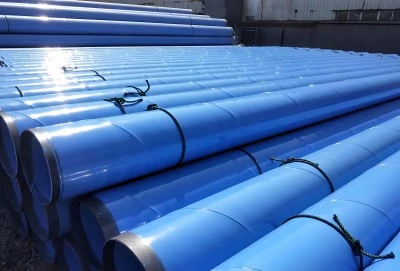Innovative Features of Epoxy Coated Steel Gas Pipes
The gas industry has long sought ways to enhance the longevity and performance of pipeline systems. Epoxy coated steel gas pipes have risen to this challenge, offering a plethora of innovative features that set them apart from traditional piping solutions.
One of the most remarkable attributes of epoxy coated steel pipes is their superior corrosion resistance. The epoxy coating acts as a formidable barrier against corrosive elements, significantly extending the lifespan of the pipes. This protective layer shields the steel from moisture, chemicals, and other corrosive agents that can compromise the integrity of conventional pipes.
Another innovative feature is the enhanced flow efficiency provided by epoxy coated pipes. The smooth internal surface created by the epoxy coating reduces friction, allowing gas to flow more freely. This improved flow dynamics translates to better overall system performance and reduced energy requirements for gas transportation.
Epoxy coated steel gas pipes also boast exceptional durability. The combination of robust steel and resilient epoxy coating creates a pipe that can withstand high pressures, temperature fluctuations, and external stresses. This durability ensures that gas infrastructure remains reliable and secure, even in challenging environmental conditions.
Furthermore, these pipes offer superior resistance to abrasion and impact. The epoxy coating provides an additional layer of protection against mechanical damage, reducing the risk of leaks or ruptures. This feature is particularly valuable in areas prone to ground movement or where pipes may be exposed to external forces.
The versatility of epoxy coated steel gas pipes is another innovative aspect worth noting. These pipes can be customized to meet specific project requirements, with varying coating thicknesses and formulations available. This adaptability allows for optimal performance across diverse applications, from residential gas distribution to large-scale industrial pipelines.
Lastly, the ease of installation and maintenance of epoxy coated pipes contributes to their innovative appeal. The smooth surface of the coating facilitates easier handling and joining of pipe sections, streamlining the installation process. Additionally, the corrosion-resistant nature of these pipes minimizes the need for frequent inspections and maintenance, reducing long-term operational costs.
Cost Savings with Epoxy Coated Steel in Gas Pipelines
While the initial investment in epoxy coated steel gas pipes may be higher than traditional alternatives, the long-term cost savings are substantial. These economic benefits make epoxy coated steel pipelines an attractive option for gas infrastructure projects of all scales.
One of the primary sources of cost savings is the extended lifespan of epoxy coated pipes. The superior corrosion resistance provided by the epoxy coating significantly reduces the need for premature pipe replacement. This longevity translates to lower lifecycle costs, as the frequency of pipeline overhauls and replacements is dramatically reduced.
Maintenance costs are another area where epoxy coated steel gas pipes shine. The protective coating minimizes the need for frequent inspections and repairs, reducing labor and material costs associated with ongoing maintenance. This reduction in maintenance requirements not only saves money but also minimizes service disruptions, contributing to improved operational efficiency.
The enhanced flow efficiency of epoxy coated pipes also contributes to cost savings. The smooth internal surface reduces friction, allowing gas to flow more easily through the pipeline. This improved flow dynamics can lead to reduced pumping costs and energy consumption, resulting in significant operational savings over the life of the pipeline.
Additionally, the durability of epoxy coated steel pipes can lead to savings in repair and replacement costs. These pipes are less susceptible to damage from external forces, reducing the likelihood of costly emergency repairs or replacements due to leaks or ruptures.
The versatility of epoxy coated pipes can also contribute to cost savings in project planning and execution. The ability to customize coating thickness and formulations allows for optimized performance in various environments, potentially reducing the need for additional protective measures or specialized equipment.
Furthermore, the ease of installation associated with epoxy coated pipes can lead to savings in labor costs during the construction phase. The smooth surface of the coating facilitates easier handling and joining of pipe sections, potentially reducing installation time and associated labor expenses.
Lastly, the improved safety features of epoxy coated steel gas pipes can lead to indirect cost savings. The reduced risk of leaks and ruptures minimizes the potential for accidents, property damage, and associated liability costs. This enhanced safety profile can also contribute to lower insurance premiums for gas infrastructure operators.
The Environmental Benefits of Epoxy Coated Steel Gas Pipes
In an era where environmental consciousness is paramount, epoxy coated steel gas pipes offer significant ecological advantages. These pipes contribute to more sustainable gas infrastructure, aligning with global efforts to reduce environmental impact across industries.
One of the primary environmental benefits of epoxy coated steel gas pipes is their contribution to reduced methane emissions. The superior sealing properties and corrosion resistance of these pipes minimize the risk of leaks, which are a significant source of methane emissions in gas infrastructure. By preventing these leaks, epoxy coated pipes help mitigate the release of this potent greenhouse gas into the atmosphere.
The extended lifespan of epoxy coated pipes also has positive environmental implications. By reducing the frequency of pipe replacements, these pipes help conserve resources and minimize the environmental impact associated with manufacturing and installing new pipeline components. This longevity contributes to a more sustainable approach to gas infrastructure development and maintenance.
Epoxy coated steel gas pipes also play a role in soil and groundwater protection. The corrosion-resistant coating acts as a barrier, preventing potential contaminants from leaching into the surrounding environment. This protective feature is particularly valuable in environmentally sensitive areas or regions with high water tables.
The improved flow efficiency of epoxy coated pipes can lead to energy savings in gas transportation. By reducing friction and improving flow dynamics, these pipes can contribute to lower energy consumption in pumping and compression operations. This energy efficiency translates to reduced carbon emissions associated with gas distribution systems.
Furthermore, the durability of epoxy coated steel pipes can reduce the environmental impact of pipeline maintenance activities. Less frequent repairs and replacements mean fewer disturbances to the surrounding ecosystem, reduced use of heavy machinery, and lower emissions from maintenance-related transportation and operations.
The recyclability of epoxy coated steel pipes is another environmental advantage worth noting. At the end of their long service life, these pipes can be recycled, with the steel component being easily recoverable and reusable. This recyclability aligns with circular economy principles, minimizing waste and conserving valuable resources.
Epoxy coated pipes can also contribute to noise reduction in gas infrastructure. The smooth internal surface of these pipes can help reduce turbulence and associated noise, potentially minimizing the acoustic impact of gas transportation on surrounding communities and wildlife.
Lastly, the use of epoxy coated steel gas pipes can support the transition to cleaner energy sources. As natural gas continues to play a role in the global energy mix, particularly as a bridge fuel towards renewable energy, ensuring its efficient and environmentally responsible transportation is crucial. Epoxy coated pipes provide a more sustainable solution for gas infrastructure, supporting the broader goals of energy transition and environmental protection.
Contact Longma
Epoxy coated steel gas pipes represent a significant leap forward in gas infrastructure technology. Their innovative features, cost-saving potential, and environmental benefits make them an ideal choice for modern gas transportation and distribution systems. As the industry continues to evolve, these pipes are poised to play a crucial role in shaping the future of gas infrastructure, balancing efficiency, economy, and environmental responsibility.
For more information on how epoxy coated steel gas pipes can benefit your gas infrastructure projects, please don't hesitate to contact us. Our team of experts at Hebei Longma Group Limited is ready to assist you in implementing this cutting-edge technology in your gas pipeline systems.














